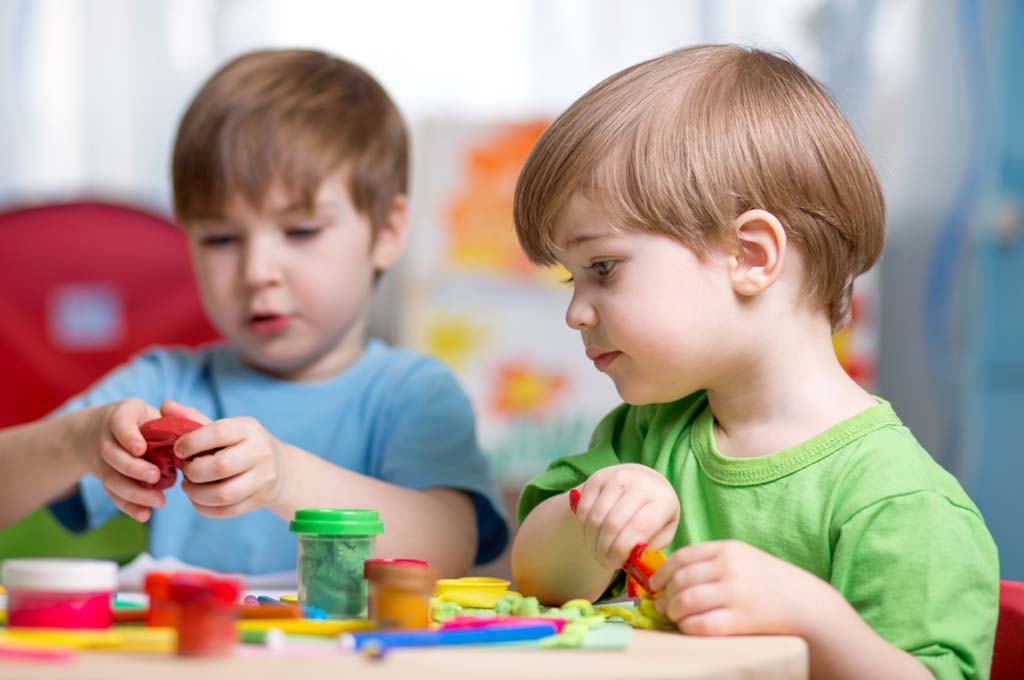If you are a regular reader of our little blog—(thank you!)—you know how often we tout the importance of play. Play is not something children do as a break from learning…
Play is learning.
Play is the way children learn to make sense of the world and their place in it. It is during play that children learn to think critically, to ask questions, to navigate social norms with their peers, and to develop motor skills. Play, whether guided or independent, should make up a large part of the day for any child.
So how can we, as parents and caregivers, make sure children get the most out of play sessions? Here are some ideas to up the productivity of your child’s play time.
Remove Electronic Distractions
Children are easily distracted from play when electronic devices, tablets, and video game controllers are nearby. Set your child up for successful play by removing such distractions and making sure the television is off.
You may want to set out a few toy or game options for your child to engage with, but let your child take the lead and, if they opt for a toy or game outside of your suggestions, that’s okay! They’re already using their play time to assert their independence and make decisions.
When You Join the Play, Ask Questions
There will be times when your child is content to play independently, and others when he or she asks you to join in. Take this opportunity to engage in some critical thinking practice and modeling.
When your child encounters a problem during play—perhaps a block tower that keeps falling over—ask them open-ended questions:
Why do you think the tower keeps falling over?
Give your child time to come up with an answer, and know it is ok if their answer is incorrect. You can listen, then guide them to the answer:
Hmmm, it looks like the base is too skinny. What could we do to fix this?
The key is to guide your child through critical thinking and problem solving so they can, one day, work through increasingly complex problems independently.
Playtime is also a wonderful opportunity to work on improving and increasing your child’s vocabulary. Depending on the age of your child, you may be able to model speaking in complete sentences. And children of any age benefit when new and different words are added to their vocabularies.
Take Play Outdoors
There’s no end to the play-based learning opportunities you’ll find when you go outdoors. During outdoor play, children can build their fine- and gross-motor skills. They also develop an understanding of spatial relationships and an appreciation for the natural environment.
Nature walks are positively magical in the eyes of a preschool child—there’s just so much to see and discover! During such walks, children learn about the flowers and wildlife in their corner of the world. They learn about seasons and why trees lose leaves or bees love flowers. The outdoors is classroom in and of itself when it comes to play-based learning.
Set Up Playdates with Friends
Play dates aren’t just a way for parents and caregivers to get a break…they are an important part of play-based learning and help your child develop that they will carry with them into adulthood.
Spending time playing with children of a similar age allows your child to improve communication skills, develop a sense of empathy toward others, and practice critical thinking with someone other than you. It also let’s them practice negotiating and handling emotions when things don’t go their way.
Play-based Learning Ideas
Since play-based learning occurs during both independent and social play, we thought we’d offer a few ideas for easy learning activities centered around play.
Independent Play Ideas
-
Threading beads onto pipe cleaners
-
Playing with playdough
-
Putting together puzzles or playing with tangrams
-
Sorting blocks or beads by size and/or color
Social Play (this may with you or with friends of the same age)
-
Board games and card games
-
Imaginative play
-
Hopscotch
-
Building a blanket fort
-
Drawing or painting
Play-based learning doesn’t have to be complicated or overly structured. It’s important to remember that the world is new and exciting to young learners—there’s just so much to see and do! As parents and caregivers, our job is to provide plenty of opportunity for play and to participate when invited to do so by the child.
For any more information, call Clovel Childcare and Early Learning Centre, don’t hesitate to get in touch with us. For any information about our Educational Programs, give us a call at 02 9199 0294 or fill in this contact us form.
Thanks for reading,
Clovel Childcare
1300 863 986











